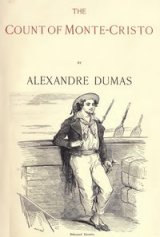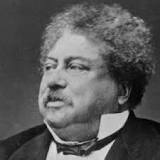The Count of Monte Cristo Page #19
The Count of Monte Cristo is an adventure novel by French author Alexandre Dumas completed in 1844. It is one of the author's most popular works, along with The Three Musketeers.
Rapid as had been Villefort’s glance, it had served to give him an idea of the man he was about to interrogate. He had recognized intelligence in the high forehead, courage in the dark eye and bent brow, and frankness in the thick lips that showed a set of pearly teeth. Villefort’s first impression was favorable; but he had been so often warned to mistrust first impulses, that he applied the maxim to the impression, forgetting the difference between the two words. He stifled, therefore, the feelings of compassion that were rising, composed his features, and sat down, grim and sombre, at his desk. An instant after Dantès entered. He was pale, but calm and collected, and saluting his judge with easy politeness, looked round for a seat, as if he had been in M. Morrel’s salon. It was then that he encountered for the first time Villefort’s look,—that look peculiar to the magistrate, who, while seeming to read the thoughts of others, betrays nothing of his own. “Who and what are you?” demanded Villefort, turning over a pile of papers, containing information relative to the prisoner, that a police agent had given to him on his entry, and that, already, in an hour’s time, had swelled to voluminous proportions, thanks to the corrupt espionage of which “the accused” is always made the victim. “My name is Edmond Dantès,” replied the young man calmly; “I am mate of the Pharaon, belonging to Messrs. Morrel & Son.” “Your age?” continued Villefort. “Nineteen,” returned Dantès. “What were you doing at the moment you were arrested?” “I was at the festival of my marriage, monsieur,” said the young man, his voice slightly tremulous, so great was the contrast between that happy moment and the painful ceremony he was now undergoing; so great was the contrast between the sombre aspect of M. de Villefort and the radiant face of Mercédès. “You were at the festival of your marriage?” said the deputy, shuddering in spite of himself. “Yes, monsieur; I am on the point of marrying a young girl I have been attached to for three years.” Villefort, impassive as he was, was struck with this coincidence; and the tremulous voice of Dantès, surprised in the midst of his happiness, struck a sympathetic chord in his own bosom—he also was on the point of being married, and he was summoned from his own happiness to destroy that of another. “This philosophic reflection,” thought he, “will make a great sensation at M. de Saint- Méran’s;” and he arranged mentally, while Dantès awaited further questions, the antithesis by which orators often create a reputation for eloquence. When this speech was arranged, Villefort turned to Dantès. 0099m “Go on, sir,” said he. “What would you have me say?” “Give all the information in your power.” “Tell me on which point you desire information, and I will tell all I know; only,” added he, with a smile, “I warn you I know very little.” “Have you served under the usurper?” “I was about to be mustered into the Royal Marines when he fell.” “It is reported your political opinions are extreme,” said Villefort, who had never heard anything of the kind, but was not sorry to make this inquiry, as if it were an accusation. “My political opinions!” replied Dantès. “Alas, sir, I never had any opinions. I am hardly nineteen; I know nothing; I have no part to play. If I obtain the situation I desire, I shall owe it to M. Morrel. Thus all my opinions—I will not say public, but private—are confined to these three sentiments,—I love my father, I respect M. Morrel, and I adore Mercédès. This, sir, is all I can tell you, and you see how uninteresting it is.” As Dantès spoke, Villefort gazed at his ingenuous and open countenance, and recollected the words of Renée, who, without knowing who the culprit was, had besought his indulgence for him. With the deputy’s knowledge of crime and criminals, every word the young man uttered convinced him more and more of his innocence. This lad, for he was scarcely a man,—simple, natural, eloquent with that eloquence of the heart never found when sought for; full of affection for everybody, because he was happy, and because happiness renders even the wicked good—extended his affection even to his judge, spite of Villefort’s severe look and stern accent. Dantès seemed full of kindness. “Pardieu!” said Villefort, “he is a noble fellow. I hope I shall gain Renée’s favor easily by obeying the first command she ever imposed on me. I shall have at least a pressure of the hand in public, and a sweet kiss in private.” Full of this idea, Villefort’s face became so joyous, that when he turned to Dantès, the latter, who had watched the change on his physiognomy, was smiling also. “Sir,” said Villefort, “have you any enemies, at least, that you know.” “I have enemies?” replied Dantès; “my position is not sufficiently elevated for that. As for my disposition, that is, perhaps, somewhat too hasty; but I have striven to repress it. I have had ten or twelve sailors under me, and if you question them, they will tell you that they love and respect me, not as a father, for I am too young, but as an elder brother.” “But you may have excited jealousy. You are about to become captain at nineteen—an elevated post; you are about to marry a pretty girl, who loves you; and these two pieces of good fortune may have excited the envy of someone.” “You are right; you know men better than I do, and what you say may possibly be the case, I confess; but if such persons are among my acquaintances I prefer not to know it, because then I should be forced to hate them.” “You are wrong; you should always strive to see clearly around you. You seem a worthy young man; I will depart from the strict line of my duty to aid you in discovering the author of this accusation. Here is the paper; do you know the writing?” As he spoke, Villefort drew the letter from his pocket, and presented it to Dantès. Dantès read it. A cloud passed over his brow as he said: “No, monsieur, I do not know the writing, and yet it is tolerably plain. Whoever did it writes well. I am very fortunate,” added he, looking gratefully at Villefort, “to be examined by such a man as you; for this envious person is a real enemy.” And by the rapid glance that the young man’s eyes shot forth, Villefort saw how much energy lay hid beneath this mildness. “Now,” said the deputy, “answer me frankly, not as a prisoner to a judge, but as one man to another who takes an interest in him, what truth is there in the accusation contained in this anonymous letter?” And Villefort threw disdainfully on his desk the letter Dantès had just given back to him.
Translation
Translate and read this book in other languages:
Select another language:
- - Select -
- 简体中文 (Chinese - Simplified)
- 繁體中文 (Chinese - Traditional)
- Español (Spanish)
- Esperanto (Esperanto)
- 日本語 (Japanese)
- Português (Portuguese)
- Deutsch (German)
- العربية (Arabic)
- Français (French)
- Русский (Russian)
- ಕನ್ನಡ (Kannada)
- 한국어 (Korean)
- עברית (Hebrew)
- Gaeilge (Irish)
- Українська (Ukrainian)
- اردو (Urdu)
- Magyar (Hungarian)
- मानक हिन्दी (Hindi)
- Indonesia (Indonesian)
- Italiano (Italian)
- தமிழ் (Tamil)
- Türkçe (Turkish)
- తెలుగు (Telugu)
- ภาษาไทย (Thai)
- Tiếng Việt (Vietnamese)
- Čeština (Czech)
- Polski (Polish)
- Bahasa Indonesia (Indonesian)
- Românește (Romanian)
- Nederlands (Dutch)
- Ελληνικά (Greek)
- Latinum (Latin)
- Svenska (Swedish)
- Dansk (Danish)
- Suomi (Finnish)
- فارسی (Persian)
- ייִדיש (Yiddish)
- հայերեն (Armenian)
- Norsk (Norwegian)
- English (English)
Citation
Use the citation below to add this book to your bibliography:
Style:MLAChicagoAPA
"The Count of Monte Cristo Books." Literature.com. STANDS4 LLC, 2024. Web. 25 Nov. 2024. <https://www.literature.com/book/the_count_of_monte_cristo_34>.




Discuss this The Count of Monte Cristo book with the community:
Report Comment
We're doing our best to make sure our content is useful, accurate and safe.
If by any chance you spot an inappropriate comment while navigating through our website please use this form to let us know, and we'll take care of it shortly.
Attachment
You need to be logged in to favorite.
Log In